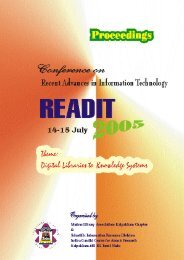READIT - 2009 - Indira Gandhi Centre for Atomic Research
READIT - 2009 - Indira Gandhi Centre for Atomic Research
READIT - 2009 - Indira Gandhi Centre for Atomic Research
You also want an ePaper? Increase the reach of your titles
YUMPU automatically turns print PDFs into web optimized ePapers that Google loves.
11<br />
8.3. Deployment of the KM System<br />
Selection of the right, nontrivial and representative pilot project and<br />
implementation of it to precede the introduction of a full-fledged KM system is<br />
important. Implementing a pilot project will give clear feedback about the difficulties<br />
encountered during execution and alternate solutions to the difficulties. The system<br />
should allow room to incorporate user feedback, prioritize and implement change<br />
requests, and finally deliver a real project. KM requires enthusiastic leadership to<br />
motivate the employees to use the system and contribute to its enthusiastic adoption.<br />
The implementation should also ensure the involvement of the user community at all<br />
times, pay specific attention to knowledge quality, and effectively market the KM<br />
system across the organisation.<br />
8.4. Per<strong>for</strong>mance Evaluation of the KM System<br />
Once the previous three phases are completed successfully, both financial and<br />
competitive impacts of KM should be measured. Selecting the appropriate metrics is<br />
important in measuring the per<strong>for</strong>mance of the system.<br />
9. ROLE OF LIBRARY PROFESSIONALS<br />
Library functions are considered as the heart of knowledge based organization.<br />
Knowledge based organizations such as an institution of higher education insists on<br />
effective library and knowledge services.<br />
The new networked electronic environment has deeply affected the world of<br />
in<strong>for</strong>mation and has an immediate impact on the role of in<strong>for</strong>mation professionals. The<br />
communication network reveals patterns of communication throughout the<br />
organization. Effective library managers should develop skills in using each kind of<br />
network to collect and transfer organizational knowledge. Commitment to staff<br />
training is an important part of both knowledge management and library services.<br />
KM primarily deals with organizing and maintaining in<strong>for</strong>mation and<br />
knowledge within an organization. The librarians should be familiar with<br />
communication networks and technological tools of in<strong>for</strong>mation management. The<br />
professionals may use internet to the fullest extent <strong>for</strong> organizing and managing<br />
knowledge.<br />
It is important <strong>for</strong> in<strong>for</strong>mation professionals to show success along with<br />
progress made on more protracted ef<strong>for</strong>ts. KM is an excellent opportunity to elevate<br />
the libraries position in an organization and this is high time that the library<br />
professionals have to develop their skills in knowledge management and to enhance<br />
their tacit and explicit knowledge management.<br />
Academic librarians can benefit their institutions, their libraries, and<br />
themselves by undertaking a campus wide role in managing organizational knowledge<br />
using the knowledge management.

















